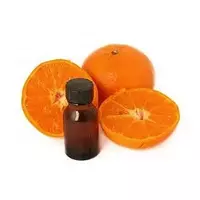Mandarin oil

The first to appreciate the fruits of the tangerine tree were the ancient Chinese - it was they who began to bring these fragrant fruits to their aristocrats. Moreover, such a gift - a whole basket of tangerines - in China was a manifestation of the highest respect and veneration. To date, scientists believe that it was because of this ritual that the tree subsequently acquired its name.
A lot is known about the taste and beneficial properties of tangerines: it is customary to eat them fresh, cook sweet meals with them, cook jams and jam, and also drink very healthy tangerine juice. In addition, mandarin essential oil is extracted from fruits and peels by cold pressing.
It is worth noting that the quality, amount and properties of mandarin oil directly depend on the variety of the fruits themselves and the peculiarities of the production technology. So, for example, there are quite a lot of varieties of these citrus fruits, while they can differ from each other both in taste and aroma, and in shape, size and color. Large tangerines growing in warm countries are called noble, in addition to them there are also Italian and Japanese tangerines - the latter are able to withstand cold, while there are so few seeds in them that they are even called seedless.
Mandarin trees today grow not only in China - they have spread quite widely around the world - the main thing is that they are warm. For example, tangerine groves can be seen on the shores of the Mediterranean Sea, where they began to be grown back in the 19th century, and in America (on the Florida peninsula) - where the climate has always been characterized by humidity and warmth.
Today, a lot of mandarin oil is produced on an industrial scale in the world - annually up to 250 tons, with most of it made in Italy. Interestingly, the cost of such tangerine oil is higher than, for example, South American, but its quality is also much higher.
The Italian tangerine oil contains a lot of lemonene - terpene hydrocarbon, which is responsible for the pronounced aroma of the product. In addition, there are other terpenoids, aromatic hydrocarbons, along with a variety of substances that differ in complex formulas that are understandable only to those skilled in the art.
For culinary purposes, mandarin essential oil is used very widely - it is added to dough for baking, pouring, creams, wines and liqueurs. For example, it is recommended to use no more than three to four drops of this aromatic concentrate per kilogram of dough, despite the fact that this dose is halved in alcoholic beverages.
tangerine oil 899 kCal
Energy value of mandarin oil (Ratio of proteins, fats, carbohydrates - ju):
Proteins: 0 g (~ 0 kCal)
Fats: 99.9 g (~ 899 kCal)
Carbohydrates: 0 g (~ 0 kCal)
Energy ratio (b | y): 0% | 100% | 0%
 Español
Español Français
Français Português
Português Русский
Русский 简体中文
简体中文 繁體中文
繁體中文 日本語
日本語 한국어
한국어 العربية
العربية Türkçe
Türkçe Қазақ
Қазақ Deutsch
Deutsch Italiano
Italiano Українська
Українська
